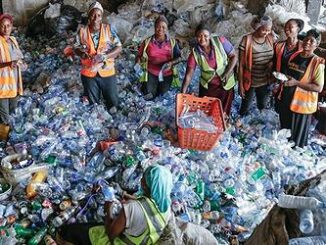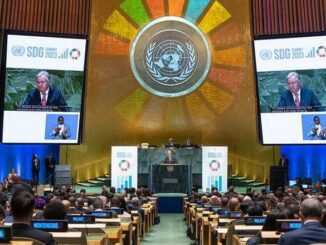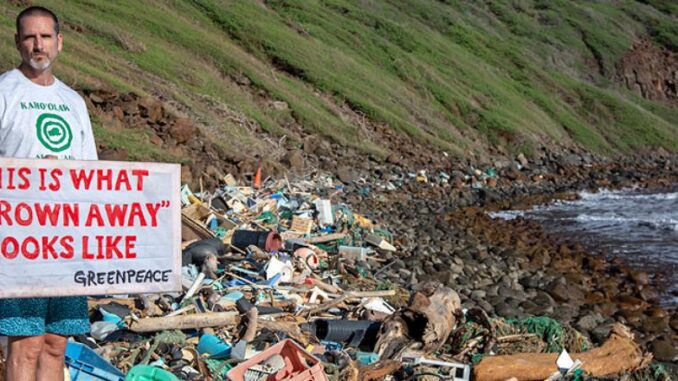
GENEVA, Switzerland, August 20, 2025 (ENS) – “Ultimately, I have heard from every country here in this room that you want to end plastic pollution. You want a deal,” Inger Andersen, head of the United Nations Environment Programme, UNEP, told delegates Friday as the latest talks to forge an international legally binding plastics treaty to halt pollution broke down in frustration.
“Is it easy? No,” Andersen acknowledged. “But do countries want an end to the environmental, economic and health impacts of plastic pollution? Absolutely.”
“It is clear that divides remain regarding core issues on production, plastic products, finance and voting. The world needs more time to come to full agreement on these critical issues,” she said.
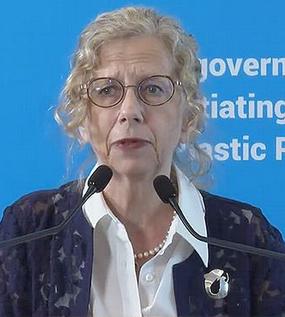
“We at UNEP will continue, undeterred, to support Member States taking this most critical mandate forward. And we will in parallel continue to support countries to fight back against plastic pollution – pollution in our groundwater, in our soil, in our rivers, in our oceans and yes, in our bodies,” she said, declaring, “Together, we can – and will – beat plastic pollution.”
Environmental groups, waste pickers, Indigenous Peoples, and youth, were at the talks, as well as fossil fuel and chemical industry lobbyists. The 10 days of talks were attended by over 2,600 delegates, representing 183 member governments and 400 observer organizations.
Seventy ministers and vice ministers, as well as 30 other high-level representatives, also attended and participated in informal roundtables on the margins of the session.
But on Friday, after 10 days of talks, negotiators were unable to reach consensus on two proposed texts and could not adopt a new treaty. Click here to see all documents from INC-5.2.
Failure to agree on key issues, such as whether the treaty should impose caps on new plastic production or put its focus instead on waste management, reuse and improved design, kept consensus on the treaty from being achieved.
Meanwhile, people are suffering under a burden of plastic.
In 2018, 17 coastal West African countries generated 6.9 million tons of plastic waste, with Nigeria alone accounting for 4.7 million tons per year. Of this, 20 percent was produced within 30 km (20 miles) of the coast, with most of it ending up in the ocean.
The cost of the damage caused by marine plastic pollution in West Africa is estimated at around $10,000 to $33,000 per ton of plastic waste. Sectors particularly hard hit by the plastic pollution are fisheries and aquaculture, marine-linked tourism, waterfront property values, and biodiversity and ecosystems, according to a series of studies funded by the World Bank.
The Negotiating Process
Formally known as the resumed fifth session of the Intergovernmental Negotiating Committee, INC-5.2, to develop an international legally binding instrument on plastic pollution, including in the marine environment, the talks presented delegates with their second chance to reach an agreement. They were unsuccessful at the fifth session in Busan, South Korea, in December 2024.
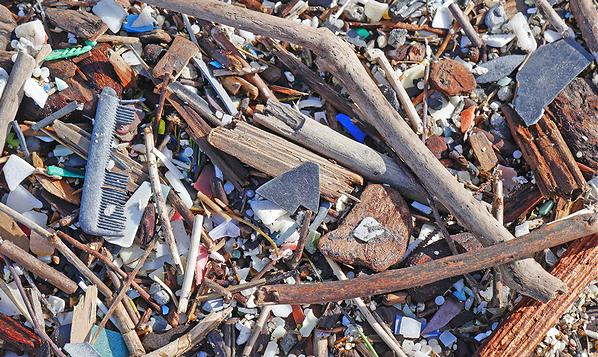
With ever-mounting levels of plastic waste, scientifically shown to be poisoning ecosystems and flooding human bodies, delegates met in Geneva hoping to overcome their differences in order to stem the tide of plastic pollution and deliver on their mandate from the United Nations Environment Assembly, UNEA.
Working in contact and informal groups for most of the meeting, the delegates exchanged views and engaged in textual negotiations based on a Chair’s Text issued in December 2024.
Among the most difficult issues was the question of whether or not the UNEA mandate covered issues related to sustainable production of plastic, the raw material used to make plastic products, and who would be responsible for financing the implementation of the future treaty.
On financing, delegates debated the inclusion of a proposed new categorization of countries, singling out “parties with a capacity” to contribute finances for implementation in the most vulnerable countries. This group could include developing countries that have plastic production and/or manufacture plastic products and have benefitted from the profits of these sales.
Delegates were also divided about whether to use the UNEA language setting out the scope, which is the full life cycle of plastic, with many supporting this approach and a few insisting on “renegotiating.”
Beyond this, in working to understand one another’s positions, they also expanded the original text, making limited progress toward a new treaty.
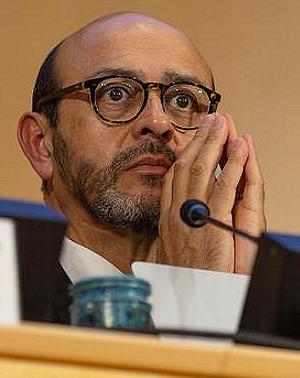
Perhaps the most significant feature of the meeting was the circulation of new texts by the INC Chair, which did not garner much support from states.
Many also expressed disappointment about the lack of clarity and “untransparent” working modalities that plagued the meeting, particularly the development of the two Chair’s texts, which some felt were “imbalanced.”
In the end, INC Chair Luis Vayas Valdivieso of Ecuador had little choice but to adjourn the meeting. He announced that there would be a resumed meeting at a date yet to be determined, although it was unclear which document they would choose as a base for further negotiations.
“Failing to reach the goal we set for ourselves may bring sadness, even frustration. Yet it should not lead to discouragement. On the contrary, it should spur us to regain our energy, renew our commitments, and unite our aspirations,” said Ambassador Vaya.
“It has not happened yet in Geneva, but I have no doubt that the day will come when the international community will unite its will and join hands to protect our environment and safeguard the health of our people,” he declared.
Path to World’s First Plastics Treaty
Of the approximately 10 billion tonnes of plastic produced since the 1950s, studies show that over eight billion tonnes are now waste, with between 10 and 15 million tonnes of plastic leaking into the marine environment each year. This number is expected to more than triple by 2050.
Studies have linked unsustainable production and consumption patterns to the exponential growth in plastic pollution, which impacts human health as well as the health of terrestrial and marine ecosystems.
In 2022 there were reports of plastic particles found in human lungs and in human blood, and a 2021 report found microplastics in human placenta.
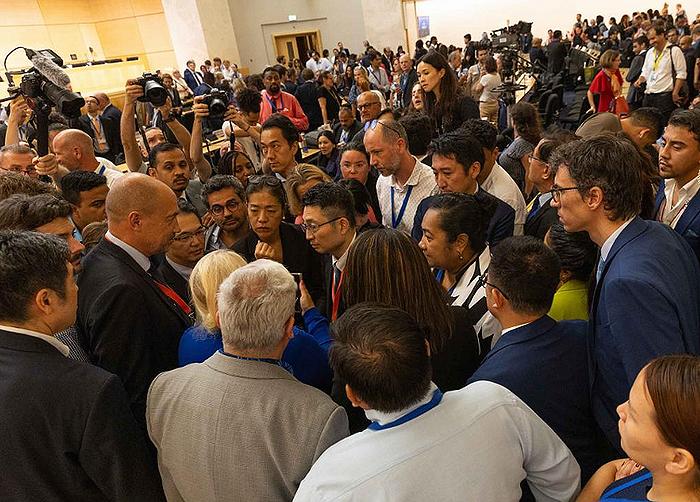
In March 2022, at the resumed fifth session of the UN Environment Assembly (UNEA-5.2), a historic resolution was adopted to develop an international legally binding instrument on plastic pollution, including in the marine environment.
The UNEA resolution (5/14) requested the Executive Director of the UN Environment Programme to convene an Intergovernmental Negotiating Committee to develop “the instrument,” which is to be based on a comprehensive approach that addresses the full life cycle of plastic, including its production, design, and disposal.
The INC began its work during the second half of 2022, with the ambition to complete the negotiations by the end of 2024.
The first session of the INC (INC-1) took place in Punta del Este, Uruguay, from November 28 to December 2, 2022. It was followed by a second session (INC-2) from May 29 to June 2, 2023 in Paris, France. The third session (INC-3) marked the process’ midway point from November 13 to 19, 2023 in Nairobi, Kenya, followed by the fourth session (INC-4) from April 23 to 29, 2024 in Ottawa, Canada.
The first part of the fifth session (INC-5.1) took place from November 25 to December 1, 2024 in Busan, Republic of Korea. The latest talks took place from August 5 to 15, 2025 in Geneva, Switzerland.
The Way Forward Not Clear
As the talks adjourned in frustration, some delegates emphasized their commitment to continuing negotiations in a further resumed INC session, while others preferred a period of reflection on how to bridge the seemingly intractable gaps, Earth Negotiations Bulletin reported. Others called for a “clean slate” and for a “new process.”
Several delegates stressed that the latest iteration of the text was unacceptable as a basis for further negotiations, preferring to use of the Chair’s Text circulated on December 1, 2024. Others proposed that the work completed in contact groups, as well as the various versions of the text be available as a basis for further negotiations.
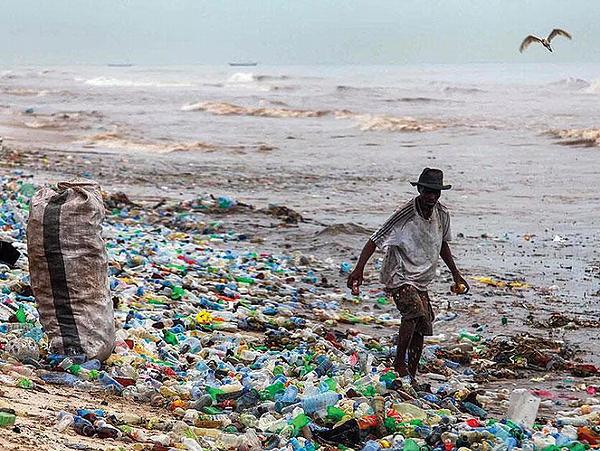
Graham Forbes, Greenpeace Head of Delegation to the Global Plastics Treaty negotiations and Global Plastics Campaign Lead for Greenpeace USA, said, “The inability to reach an agreement in Geneva must be a wakeup call for the world: ending plastic pollution means confronting fossil fuel interests head on. The vast majority of governments want a strong agreement, yet a handful of bad actors were allowed to use process to drive such ambition into the ground. We cannot continue to do the same thing and expect a different result. The time for hesitation is over.”
“The plastics crisis is accelerating, and the petrochemical industry is determined to bury us for short-term profits. Now is not the time to blink. Now is the time for courage, resolve and perseverance. The call from all of civil society is clear: we need a strong, legally binding treaty that cuts plastic production, protects human health, provides robust and equitable financing, and ends the plastic pollution from extraction to disposal. And world leaders must listen,” Forbes said. “The future of our health and planet depends on it.”
Editor’s Note: Additional reporting by Earth Negotiations Bulletin.
Featured image: Greenpeace Ocean Director John Hocevar near plastic trash piles on Kanapou beach on the Hawaiian island of Kaho’olawe. October 22, 2018 (Photo courtesy Greenpeace USA)
© 2025, Environment News Service. All rights reserved. Content may be quoted only with proper attribution and a direct link to the original article. Full reproduction is prohibited.

